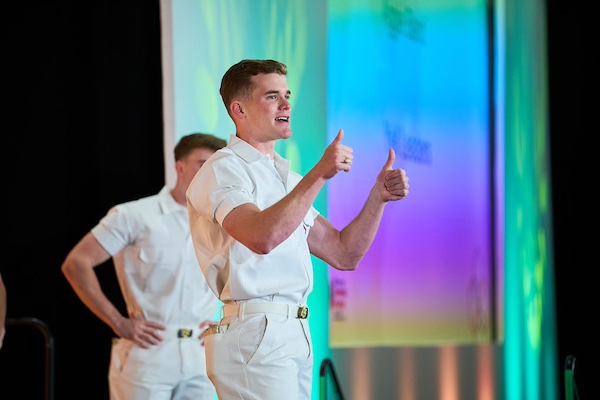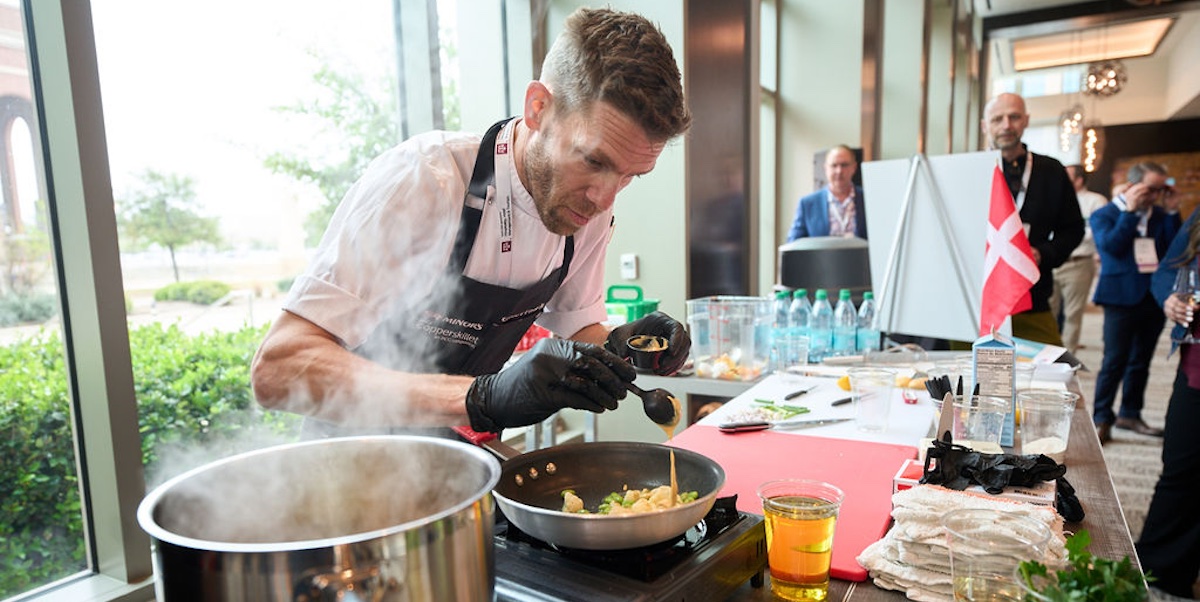The crowd counted down, and the race was on. Four chefs grabbed ingredients and rushed back to their stations to create an award-winning dish within 30 minutes. Those in attendance wandered around, wondering what the chefs would make. You could almost see the thought bubbles above their heads: “Sea bass with those ingredients? Interesting.” “Beef and fish? How’s that going to work?” “What’s he going to do with all that honey?”
This was the Global Copper Skillet Competition, an event at the 2025 International Association of Conference Centres (IACC) Americas Knowledge Exchange. Held at the Texas A&M Hotel and Conference Center in College Station, Texas, March 31-April 2, almost 200 IACC members and industry partners met for connection, education and inspiration. And, of course, to watch some rising chefs during the cooking competition, a long-held tradition at the conference.
“When Copper Skillet was first devised, 15 years ago, it was at a time when celebrity chefs weren’t present,” says Mark Cooper, CEO of IACC. “So, cooking was cooking. It wasn’t the popular thing to do. Now, most people are interested. Originally, Copper Skillet was devised to bring out of the kitchen the level of skill and artistry that member venues apply to food and beverage programs.”
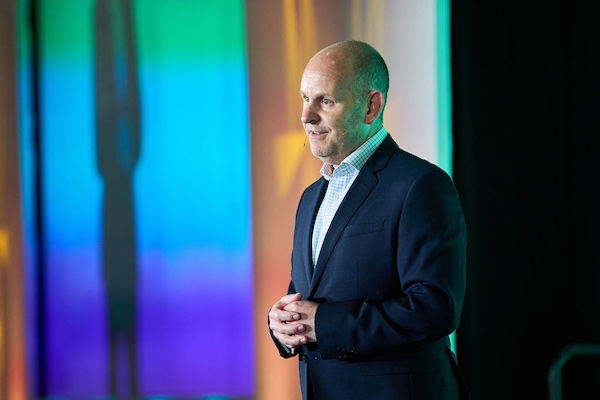
The competition, composed of junior and senior levels, also helps elevate the individual chefs.
“It will propel them in their career,” Cooper says. “They will go on and mentor and encourage other chefs to come into the meeting and conference industry.”
The competition starts with three heats, one each in the Americas, Australia/Asia-Pacific and Europe. One senior and one junior winner from each move on to the global finals.
While there are normally six chefs competing, this year there were only four due to one of the chapter winners changing jobs and another being sick. With four great dishes now plated after the half-hour run, the judges had a difficult (and tasty) task to determine the winners.
Would it be Cassidy Chas, a junior chef from the AT&T Hotel and Conference Center (FLIK Hospitality)? Or could it be junior chef Lena Cybulska from the Wyboston Lakes Resort in the U.K.? Perhaps senior chef Eirik Kauserud from the University of Michigan Ross School of Business (Aramark Destinations) will come out on top. Or maybe senior chef Fredrik Olsson from the Rungstedgaard Hotel in Denmark will take the prize.
A Lone Star return
Cooper mentioned at the opening reception that IACC hadn’t held a conference in Texas since 1982. And there’s a reason the organization chose College Station over some of the state’s larger cities.
“We looked at the venue in terms of how new it is, what it’s doing that’s innovative and different,” he says. “This is a modern venue, so it makes great sense to be here.”
He also says the number of accolades, acknowledgements and awards the team at the Texas A&M Hotel and Conference Center has received proves something special is happening at the venue.
Some of the accolades the center has received include five 2020 Stella Awards for best food and beverage, best onsite support staff, best hotel/resort, best sustainability initiative and best hotel/resort event space. It’s also been recognized by AAA for its cleanliness and service.
“Customer service was at the real heart of it and part of our determination to come back to Texas, as well,” Cooper says.
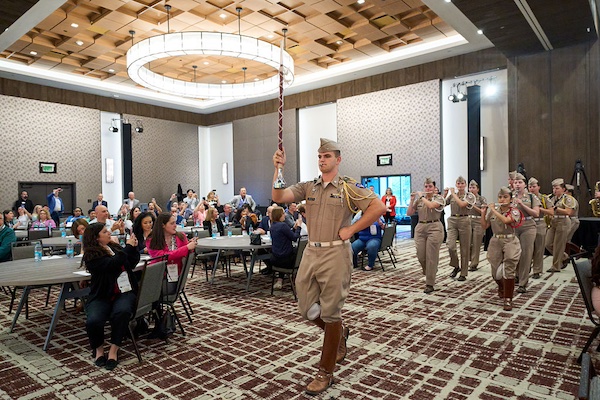
The center’s connection to the university helped it coordinate several energetic experiences during the conference. From Aggie Yell Leaders teaching attendees some of the school’s spirited “yells” to the Fightin’ Texas Aggie Band opening a day’s sessions to the Lil’ Wranglers Dance Troupe showing off their line-dancing skills one afternoon, conference attendees learned that tradition and community run deep in College Station.
Forward-focused education
Attendees also experienced elevated educational and keynote sessions that gave them skills and knowledge to succeed in their jobs.
Branding expert Brandon Coleman, Jr., delivered a keynote showing the strategy behind effective branding; Colonel Tom Magness of Thayer Leadership shared leadership experience from his military career; and University of Texas Associate Dean Gaylen Paulson led a session on the art of negotiation, even having attendees participate in a planner/supplier exercise that was challenging and eye-opening.
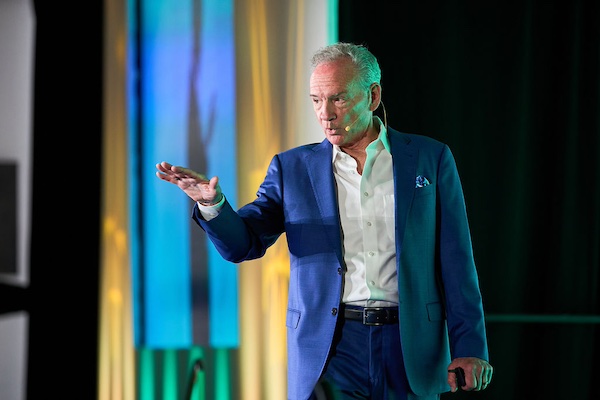
There were also stand-alone interactive workshops and discussion groups each day. These ranged from understanding how to give constructive feedback to creating a sales mindset to how to foster attendee engagement. Attendees also learned how to conduct a strategic F&B audit for sustainable events, how to attract and retain talent and how the corporate hospitality sector is evolving.
One of the discussions featured a Q&A with hospitality students from New York University and Texas A&M University who were volunteering at the conference. Students—and their thoughts about the industry—are vital to IACC.
“The students are a really important part of it,” Cooper says. “The reason is that this is global. Quite often when you talk with hospitality schools and students for the first time, the meeting industry isn’t obvious and visible as opposed to some of the more bright-light sort of resorts, festivals and sporting events side of our business.
“But, as we know, the meeting industry is an incredibly rewarding industry. So, we truly believe it’s our responsibility to ensure that we bring that forward, not through lecturing at hospitality schools, but by bringing the students into our environment. And because our event is in spring, it’s at a key time when the students are looking for their first role in employment in the summer.”
Cooper says that every time IACC runs its annual conference, wherever it is in the world, the organization will engage with at least one hospitality school. That’s because the industry is about looking forward.
“One hundred percent it’s the future,” he says. “Everybody in this room was introduced to meetings and conference centers at some point, probably after they’d already started a hotel career in a broader sense, or a hospitality career. What we see is that once people come into this industry, they stay in it. So, it must be appealing. It must be a great career. So, bringing students in at a very early age, that’s part of our strategy.”
And the award goes to…
Another component of the conference was its annual awards event. Katie Davis (Aramark Destinations) received the 2025 Award of Excellence for her contributions to IACC education, and Murray Hall (Georgian College) received the IACC Americas Distinguished Service Award for his commitment to IACC’s culinary and Copper Skillet programs.
The event was also where attendees learned who won the Copper Skillet awards.
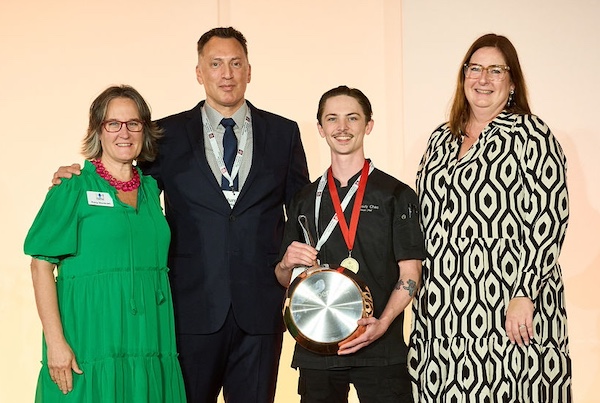
This year’s winners were junior chef Cassidy Chas (as seen above) and senior chef Fredrik Olsson (as seen below).
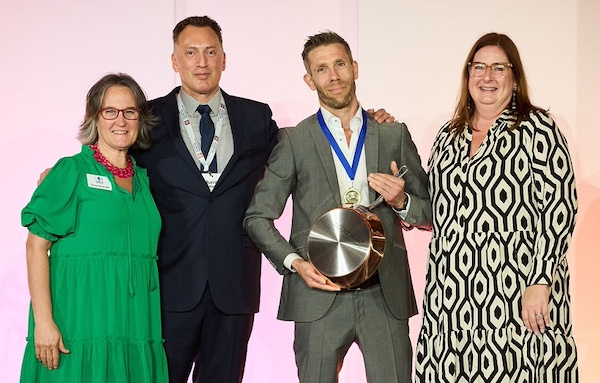
IACC isn’t the largest association in the world, and it doesn’t want to be, Cooper says. During the closing session, he talked about creating a certain kind of culture and how the organization doesn’t believe that kind of culture can be created by forcing people with different ideas into a room.
“It’s a very unique group that is here because they recognize that they’re investing, being invested in or they need the tools to invest in their team,” he says. “Our culture is one that comes about through wanting to be inquisitive and curious and wanting ideas.”
From discovering new industry innovations to building partnerships, this year’s IACC Knowledge Exchange deserves an Aggie “Gig ‘em” thumbs up for its success.
